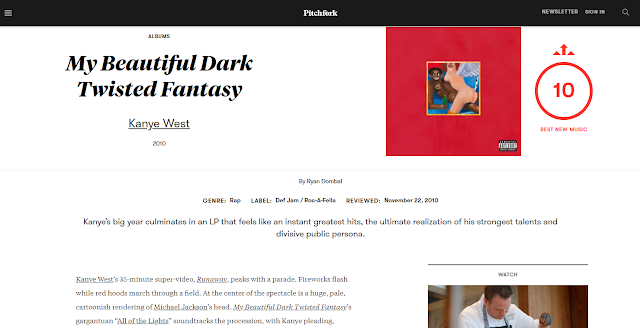Platformer - "How platforms killed Pitchfork"
By Casey Newton
"As a longtime and once diehard reader of the site, my feelings tracked exactly with Cox’s. Created by Ryan Schreiber in 1996 while he worked at a record store outside of Minneapolis, Pitchfork came to prominence in the early 2000s on the back of its obsessive, audacious, and (yes) often obnoxious reviews.
I was an early college graduate in those days, and considered good taste in music a pillar of my identity, and so in hindsight it was inevitable that I would come to read the site religiously. Each day, I would read the site’s daily reviews during my lunch break, waiting for the moments when the staff would hand out one of their relatively rare “best new music” designations.
In the early days I remember laughing out loud at Pitchfork’s reviews, which often ran into the thousands of words and at times seemed to have little to do with the music itself. Over time, though, I came to appreciate the vast musical knowledge possessed by even the most occasional freelancer for the site. Open a review of a band you had never heard of and you could be certain the piece would place their new record in the context of everything else they had ever recorded, the genre in which they operated, and possibly the entire history of recorded music.
And beyond being knowledgeable, Pitchfork was deeply opinionated. At a time when Rolling Stone and other music magazines were rubber-stamping nearly every review with a milquetoast three-star rating, Pitchfork went out of its way to pick fights, famously slagging Liz Phair, the Dismemberment Plans’ Travis Morrison, and others during its early reign of terror.
People hated them for it, of course, and roughly half of the anti-hipster discourse that dominated Tumblr in the late 2000s seemed focused on the pretension and snobbery that, to some people, Pitchfork had come to represent. What that criticism missed was how often Pitchfork got it right: in its famous (and appropriate) veneration of Radiohead, of course, but also in the way it championed Wilco, Arcade Fire, Cat Power, Bloc Party, and dozens of other great artists long before they achieved wider success.
Crucially, Pitchfork also served as a bridge between boomer and Gen X music critics and millennials. While it was best known for its daily reviews, Pitchfork also took a stab at curating a canon, with occasional lists of the best songs of previous decades putting contemporary indie rock, pop, and hip-hop into conversation with the past.
It had its blind spots, of course: the site was particularly slow to pay significant attention to pop and hip-hop. But it eventually broadened its focus, and by the time it got acquired it was the standard bearer for sharp, literate music criticism."


No comments:
Post a Comment